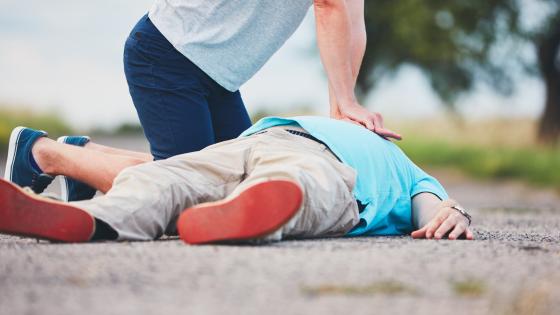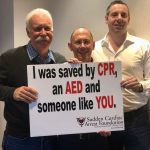Are you worried about getting sued if you provide bystander CPR in a public place? New research suggests that you don’t have to be. In fact, you are more likely to get sued if you don’t intervene.
Dr. Travis Murphy undertook the most comprehensive review to date of jury verdicts, settlements, and appellate opinions focused on lawsuits involving cardiopulmonary resuscitation (CPR). His team analyzed 170 cases launched between 1989 and 2019 across all 50 states.
Murphy said the data shows that “no non-medical person has been successfully sued for providing bystander CPR” to those who appear to be in cardiac arrest or trouble. “There have been far more cases brought due to delays in [providing] CPR rather than for providing CPR,” he added.
Murphy, who is an emergency medicine attending physician and a fellow in surgical critical care at the University of Florida in Gainesville, said nearly all the CPR cases (167 out of 170) involved an allegation of negligence, namely not providing CPR when it might’ve helped. In sum, those cases generated punitive damages of roughly $620 million.
Of the three cases in which defendants were charged with battery assault because they did administer CPR, only one was convicted. And that was because “the patient already had a signed ‘Do Not Resuscitate’ order and received CPR anyway in their nursing home,” Murphy explained. The nursing home paid more than $121,000 in damages.
The other two cases were ruled in favor of the bystanders. And that, said Murphy, suggests that bystanders are very well protected by “Good Samaritan” laws.
“The laws vary from state to state,” he explained, and some states do have limitations in place. For example, Kentucky statutes only protect bystanders who offer CPR assistance if they are medically trained.
But most states fully protect bystanders who sincerely try to help, Murphy stressed. Some states even have “Duty to Act” laws that establish fines specifically for bystanders who are medically trained to provide CPR but choose not to help when an emergency unfolds. (Minnesota, Rhode Island and Vermont are three such examples.)
The findings come as little surprise to Dr. Michael Kurz, an associate professor in the department of emergency medicine with UAB Medicine and the Alabama Resuscitation Center in Birmingham.
“There is good scientific literature that suggests that the risk of liability when you stand up in this regard is miniscule, if it exists at all,” Kurz said.
But what should a bystander do if he/she is not trained in CPR?
Murphy said, “Ideally, we would like to see more people trained in CPR. But understanding that not everyone will be trained, calling 911 immediately would be the best course of action, since this is so time-sensitive.” Online CPR Training Courses exist and are just as effective in teaching the life-saving skill as classes held in person.
That thought was seconded by Kurz, who also serves as chair of the American Heart Association’s task force for telecommunicator CPR.
“In general, we encourage the lay public to render aid that they feel comfortable with,” he said. “But any assistance is better than no assistance. Because the alternative in the face of a cardiac arrest is the patient dies if no assistance is given,” Kurz added.
“So you can call 911, and the dispatcher can send appropriate help. But then, in addition, [they] can also provide ‘just in time’ simple CPR instructions over the phone within 20 seconds. That’s all you need to be instructed on how to do it in an emergency, with absolutely no prior training,” Kurz explained.
Murphy’s findings are scheduled for presentation at the American Heart Association meeting, in Philadelphia, Nov. 16 to 18.
Research presented at medical meetings should be considered preliminary until published in a peer-reviewed journal.
Article Source: https://www.usnews.com/news/health-news/articles/2019-11-12/you-wont-get-sued-if-you-do-cpr-review-suggests





